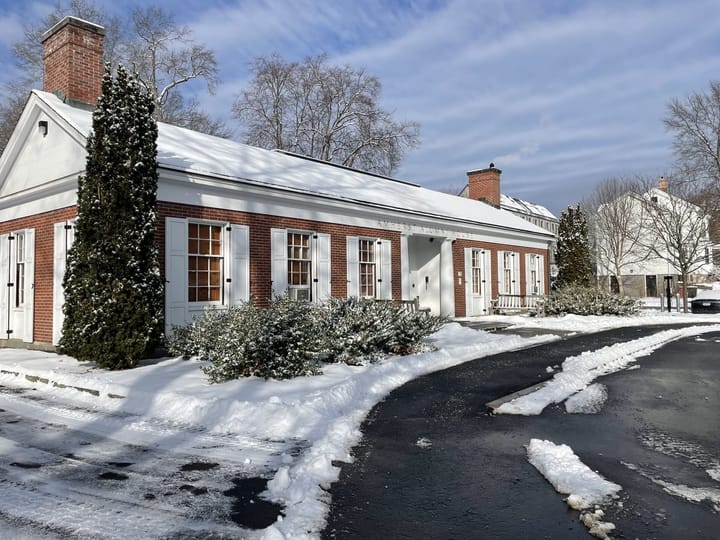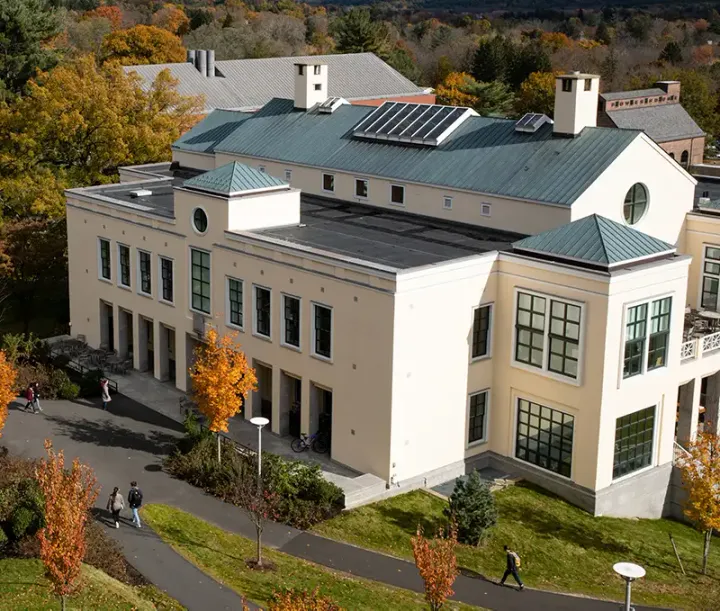Fein fights to stop school shootings
Throughout his 30-year career, Fein has worked with everyone from workplace management staffs to the U.S. Secret Service, researching targeted violence, and aiming for prevention. In the 1990s, he and his colleagues examined every case of assassination or attempted assassination in the last 50 years. They looked over these cases in a systematic way, trying to understand how a person moves from the idea of attack to the actual deed. The group interviewed many assassins and would-be assassins in an attempt to see and understand the attacker’s perspective. Later, in 1999, after the shootings at Columbine High School, Fein used the same approach, researching 37 school shootings from the previous 25 years.
Amherst teaches to ask
Amherst teaches to ask
Fein, an American Studies major at Amherst, firmly believes that his Amherst education was invaluable. He feels grateful for his liberal arts education at the College. “[I was] challenged to look at things skeptically, to ask better questions [and] to realize that my generation was not the first in human history and would not be the last,” he said. A big university, Fein is convinced, could not possibly have provided the same opportunities. “[My time at Amherst] helped a lot later in life by teaching me to ask better questions; by helping me to understand that there are many limits to what we know; by exposing me to people, ideas, and experiences. [Amherst is] a safe environment-physically, emotionally and intellectually. I had, in many ways, the freedom to think and learn and grow, and to challenge my concepts of things.”
Fein took advantage of the opportunities that Amherst provided. While a student, he wrote for The Student and worked with volunteers at the Northampton State Hospital. His greatest achievement, however, was helping to create the College Council in order to “bring together students and faculty.”
Fein was at the College during the Vietnam War, a time of “enormous ferment” on campuses across the country. The College was filled with radical thinkers, who often clashed with more conservative students and adults on campus. Fein wanted to help build stronger bonds within the Amherst College community in order to bring together radicals and conservatives, students and faculty.
During his junior year, Fein decided to take time off from Amherst. However, in the 1960s, a young man could not leave school without the risk of being drafted. Fein decided to attend school elsewhere on domestic exchange for a semester, and became the first male undergraduate to attend Sarah Lawrence College in New York.
After earning his bachelor’s degree from Amherst, Fein went on to obtain a doctorate degree in psychology from Harvard University. Upon his graduation from Harvard, Fein was employed under Dr. Shervert Frazier, one of the nation’s leading experts on the psychology of violence. It was not until Dr. Frazier suggested that he work with criminals that Fein began to go in that direction. Up until that point he had thought that he would develop a career dealing with disturbed children.
“It was one of those cases where I just followed my mentor’s advice,” he said. Frazier and other senior colleagues opened many doors and provided many useful opportunities for Fein. Fein worked with Frazier at the Bridgewater State Hospital for nine years with the “criminally insane,” learning about the lives and thought processes of mentally ill men who had acted violently.
Preemptive care
Preemptive care
After the assassination attempt on President Ronald Reagan in 1981, the Secret Service looked to improve its relationship with the mental health community and recruited Fein to help as a consultant during the early 1980s. For the last twenty-five years, Fein has worked with the Secret Service.
In 1985, Fein was approached by the commissioner of Massachusetts’ Department of Mental Health to start a Division of Forensic Mental Health within the department. The purpose of the new division was to try to prevent those with mental illnesses from being inappropriately sent to the criminal justice system. “Jails were not designed to be caretaking institutions for people with serious mental illnesses,” said Fein.
After working with the division for six years, in 1991, the director of the U.S. Secret Service asked Fein to assist them on a full-time basis to study the prevention of assassinations. Fein had what he called “the rare honor and opportunity” to conduct an operational study that was used to improve the protection of the nation’s leaders. “[My primary goal was] to gather information that could be useful to law enforcement professionals,” he said. He helped to train Secret Service agents based on what he and his colleagues had learned about the prevention of targeted violence. He later applied what he then learned to the problem of preventing school shootings, and used it to guide and aid principals, police officers and community leaders in assessing potentially dangerous situations at their own schools.
Although Fein has had a successful career, he asserts that what is truly rewarding is seeing his research applied for good in the real world. He has won awards, but declined to discuss them in detail. “[They’re] silly, in a way. If anything I’ve done has helped people prevent violence, that is really terrific,” he said.
One obstacle that Fein has faced in his work is the fact that “there are no really good large organizations.” His career requires that he work with others, but he finds it difficult sometimes. “When people get together to do things, as well-meaning as they may be, it gets really hard to be successful.”
Fein stresses the importance of education as a means of pre-emptive prevention of targeted violence. “[I want to] find ways to work with people who share my values on projects that are worth doing, to try to educate, educate, educate, on the notion that most people want to do the right thing, but may not know how.” Because of this, Fein and two of his colleagues started a small non-profit organization, the National Violence Prevention & Study Center, approximately two years ago in order to study and work on the prevention of targeted violence.
Fein heavily stressed the importance of recognizing one’s boundaries. “If one can share both what one knows and the limits of one’s knowledge, maybe together we can learn what we need to know to get from here to there,” he said.
During the recent sniper shootings, experts all over were giving their opinion of the sniper’s profile. “It seemed to me that ninety-seven percent of those commenting had no idea what they were talking about,” said Fein. “There aren’t any profiles of that rare kind of violence.” When he was contacted by journalists, Fein refrained from commenting.
Fein is a firm believer in learning from experience and making new mistakes instead of repeating the same mistakes again. He does not, however, believe in putting so much emphasis on searching for knowledge that action becomes impossible. He hopes to strike a balance between “people who just want to plow on ahead believing that they know more than they know [and] people who are afraid to take any step forward until they’ve finished studying everything.”
The present and future
The present and future
Fein’s first priority, though, is his family. Fein himself grew up in a typical nuclear family, with two parents and a younger brother. When asked what his goals for the future are, Fein immediately answered, “I hope to be the best spouse, parent and grandpa that I could possibly be.”
Currently, Fein resides in Massachusetts with his wife of 26 years, a professor of negotiation & conflict management at M.I.T. He is happily married and thinks himself lucky to have found a wonderful spouse who loves her job also. Fein has three stepchildren (one of whom, Tim Rowe, graduated from Amherst in 1989) and three grandchildren, with another on the way. “Grandkids,” he declares, “are the best thing in the world.”
Fein plans to continue to study the prevention of targeted violence. He focuses on doing research that is operationally relevant, and not primarily for scholarly publication. “One thing I try to do, which I probably got from being at Amherst, is to contribute to the public good a little bit. I try to write for people who have daily prevention and protective responsibilities,” he says.
Fein has recently been offered a chance to take part in the war against terrorism, and is glad to assist in “keeping America and its citizens a little safer.” Fein hopes to become “someone who leaves the world, if not a better place, not a worse place for having been here.”





Comments ()